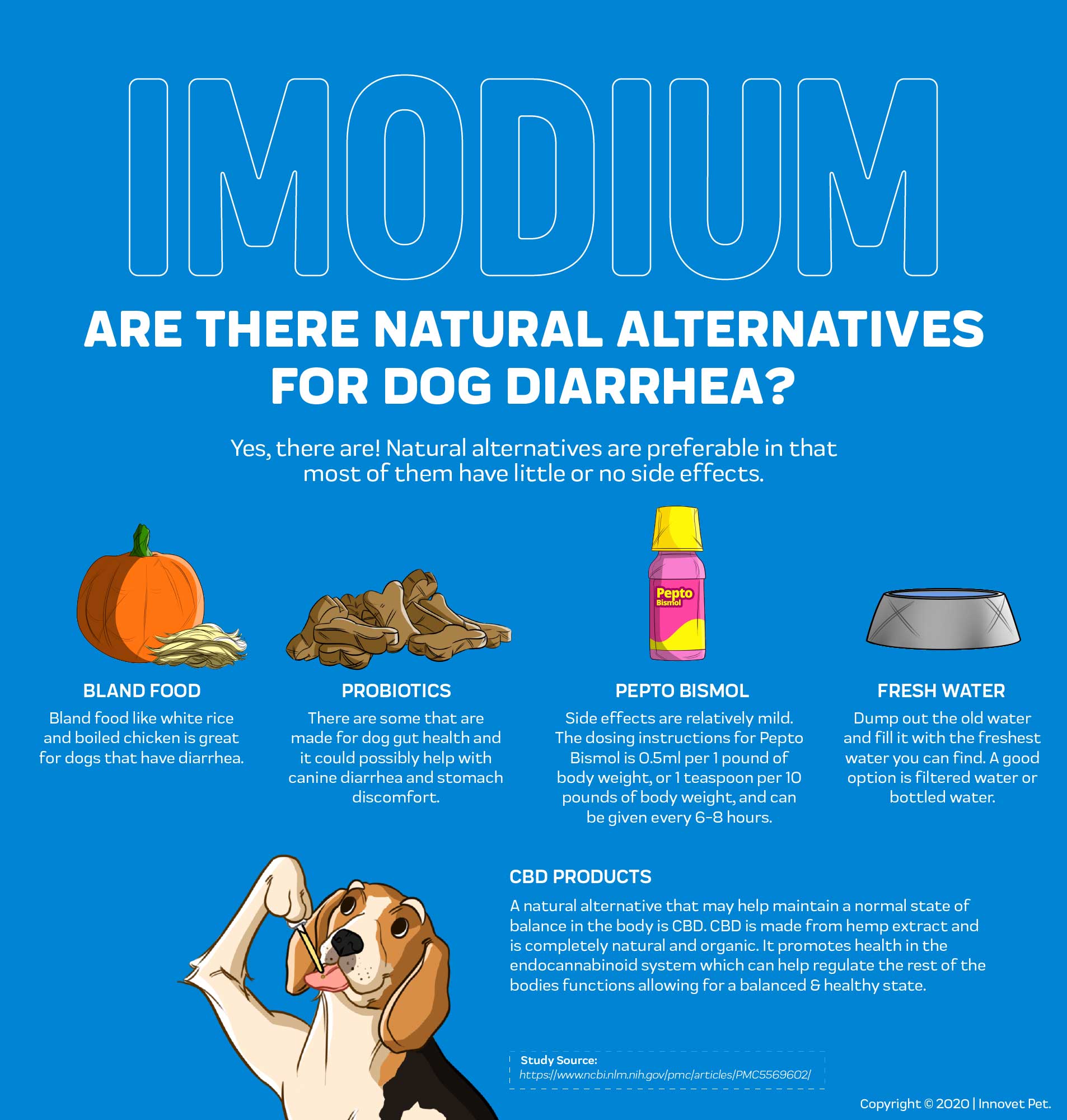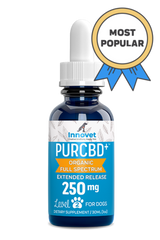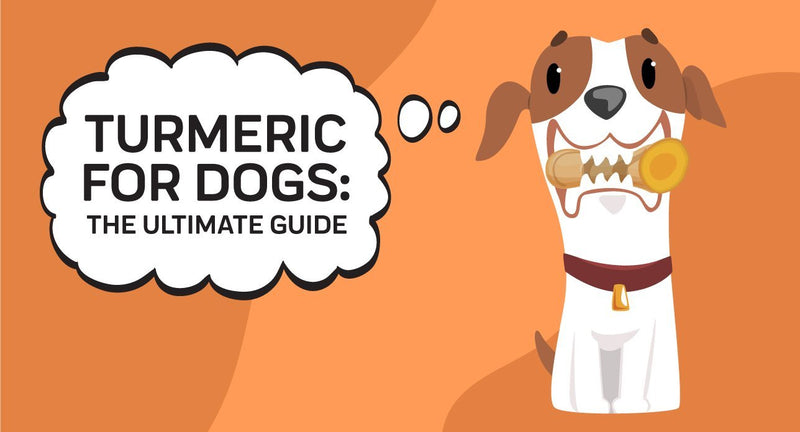
If you are here, you may be wondering about possibly giving your dog Imodium. Imodium is a medication that many humans take for an upset stomach, diarrhea, and other symptoms. Some people really don't know if they can give Imodium for dogs to their furry friend for their symptoms. We will help you learn as much as you can about Imodium for dogs in this article. After all, we know how much pet parents worry about their pets and we want to do everything we can to ensure that you are given as much information as possible.
- What Causes Diarrhea And Stomach Upset In Dogs?
- What Is Loperamide?
- Is Imodium Safe For Dogs?
- Safe Dosage Of Imodium For Dogs
- Can I Give Imodium-AD To My Dog?
- What Is The Recommended Dosage Of Imodium For Dogs?
- Side Effects of Imodium For Dogs
- What Happens If I Give My Dog Too Much Imodium?
- Are There Natural Alternatives For Dog Diarrhea?
- CBD As A Natural Alternative For Dog Diarrhea
- Imodium For Dogs: Last Thoughts
Dogs sometimes get diarrhea, stomach aches, and abdominal pain. This happens to dogs as commonly as it happens to humans. The important thing to note is that it can be caused by any number of ailments.
Dog diarrhea can happen from foods that they are intolerant toward, environmental toxins, or an illness. It could be from any number of things. The best bet would be to take your pet to a trusted vet if the symptoms of diarrhea and gastrointestinal pain persist. This is to ensure that they are diagnosed and treated properly for whatever it is that they have going in with their health.
What Causes Diarrhea and Stomach Upset in Dogs?
As previously mentioned, there are various things that can cause a dog to have an upset stomach and diarrhea. Older dogs are typically more prone to having stomach upset and diarrhea than younger dogs. Dogs that have been diagnosed with medical issues, dogs with an immune system that is weak, or dogs that have sensitivities to food are all much more likely to have these symptoms come up.
The biggest reason that dogs get upset stomach and diarrhea is due to their diet. It could be the type of food they are eating, the amount, or some other issue related to their food intake. For example, some dogs are simply willing to eat anything that they think looks like food. Pet parents that have a very precocious furry friend have likely encountered this. You may have seen your pet chewing on a toy or some piece of household furniture and even trying to swallow it. These types of pets must be watched like a hawk as you can never tell if they are eating something that they should be or not. This could easily cause them to get an upset stomach and have diarrhea as well.
Just like humans, dogs can also have stomach upset if they are anxious or suffering from motion sickness or stress. This is something that is individual to each dog and their own personality and behavior that is unique to them. Pet parents will likely notice it if they take their pet on trips or have situations where they notice that their pets suddenly experience stomach upset. Paying close attention to what could be triggering their symptoms is vital in figuring things out and possibly coming up with ways to avoid the triggers.
How Does Imodium Work?
Imodium is the brand name of this anti-diarrhea drug. It is sold under this brand name and is what people most commonly see it as. There are other generic versions of this drug that contain the same ingredient or similar ingredients.
Imodium is for preventing diarrhea in humans. People often find it in their drug store or grocery store and it is sold in tablet form as an over the counter medicine. There is also a prescription form of this. Humans that take Imodium find that they have quick relief from the number of symptoms that they were previously experiencing. It works quite quickly to reduce the frequency of diarrhea that a person has been suffering from and can also help with the stomach discomfort and other symptoms that are associated. However, it is mostly used for anti-diarrhea.
Imodium is used as a veterinary medicine used in treating diarrhea in dogs. The active ingredient in Imodium is loperamide hydrochloride, which works by slowing down the movement of the intestine. This reduces the amount of water and electrolytes that are lost through diarrhea and helps to firm up the stool.
Imodium is available in liquid and tablet form and can be given with or without food. It is important to follow the dosage instructions provided by your veterinarian, as too much Imodium can lead to constipation. If your dog is taking Imodium for more than a few days, it is important to have them checked by a veterinarian as diarrhea can be a symptom of other underlying health issues.

What Is Loperamide?
Loperamide is the generic name for Imodium. It works by slowing down digestion and gives the small intestines time to do their job. It is also given to people that have an ileostomy. Loperamide should not be taken if a person is having diarrhea and if they are experiencing a high fever along with their diarrhea, ulcerative colitis, or stools that are bloody. It is also not advised to take it if there is a bacterial infection present.
It is a medication that must be taken as prescribed. There are severe health consequences possible if a person takes too much loperamide. Dogs are sometimes given loperamide by their vet. This is for more serious diarrhea. Some of the prescribed versions contain opioids. The prescription that contains opioids will likely require veterinary oversight and more care when giving it to a dog. This is because the side effects are more severe and it is important to be careful when giving a prescription that contains opioids. The same is true for human beings that are given a prescription of loperamide with opioids. A doctor will give a prescription for a certain amount and with specifications on how much to take and when to take it. They will likely give the
Is Imodium Safe For Dogs?
Imodium is a safe option for some dogs in certain circumstances. It is vital to note that certain breeds of dogs may not be able to take Imodium for dogs. Dogs that are Shetlands, Sheepdogs, or Australian Shepherds should not take Imodium. Basically, Imodium is not recommended for dogs of the herding breeds. There is a mutation in their genes that affects the production of an essential protein in the body. Dogs with this mutation cannot break down the essential protein and this medication in their systems and can worsen their condition.
Imodium for dogs is also not given to dogs with liver disease or kidney disease. There are also other disorders that could interfere with safely taking Imodium. It is vital for pet parents that have dogs with health conditions such as liver disease, kidney disease, or Addison's disease to consult with their trusted vet before giving their pets this anti-diarrhea medication. Also, pet parents with dogs in

Safe Dosage Of Imodium For Dogs
Dogs are just like humans in that taking too much of a medication can be toxic to their bodies. It can cause dangerous and deadly side effects. It is imperative that pet parents follow dosage instructions given by the vet. Never give a dog doses of Imodium that are higher than 40 mg per kg of their body weight. This can cause the toxicity levels that are dangerous to pets. Sometimes, getting close to 40 mg per kg of body weight is still too much for the dog. It is better safe than sorry. Only give the recommended dosages and never more.
Dogs that are currently taking other medications or that have a medical condition will need to be evaluated by the veterinarian before giving dogs Imodium. This is to ensure that they are able to take this medication safely. Your trusted vet will be able to let you know whether or not your dog can safely take Imodium and what dosage they can take if they are found to be able to take it.
Can I Give Imodium-AD To My Dog?
You can probably give your dog Imodium-AD if they are healthy, if they do not have the gene mutation associated with the breeds mentioned above, and if they are not under two years of age. It is imperative that pet parents ask their trusted vet about Imodium mult-symptom relief if there is any doubt about giving their dog Imodium-AD.
Dogs that have been having diarrhea can be given the recommendations, however, not if they have blood in their stools. Blood in the stool can mean other health conditions and the dog should not be given Imodium for dogs.
The best course of action is to ask your pet's trusted veterinarian if they feel as

What Is The Recommended Dosage Of Imodium For Dogs?
If your dog has been cleared to take Imodium by their vet, the recommended dosage for dogs is 0.1mg per kg of their body weight up to two times a day.
That means that a ten-pound dog can take a .4 mg dose and a dog that weighs fifty pounds can take a dose of 2 mg. Small dogs that need to take a smaller dose would be better off taking the liquid form of Imodium for dogs. The tablets are more for larger dogs that weigh more.
Of course, the liquid form can be used in dogs that do not like to ingest tablets. This is

Side Effects Of Imodium For Dogs
Side effects of Imodium for dogs can happen. The most common side effect of Imodium for dogs is constipation. The medication works on the small intestines and it can cause the bowels to get backed up. It can also cause bloating, heavy breathing, and respiratory distress. Dogs that experience these side effects will need to get to the vet right away. Some of these side effects can be emergencies. Make sure to keep
What Happens If I Give My Dog Too Much Imodium?
Giving your dog too much Imodium can be dangerous. The recommended dosage as listed above is the best course of action. However, if you accidentally give your dog too much Imodium, you should take them to the veterinarian or call them to see what

Are There Natural Alternatives For Dog Diarrhea?
Yes, there are natural alternatives for dog diarrhea. It is understandable that pet parents are concerned about giving their dogs something that has side effects. Natural alternatives are preferable in that most of them have little or no side effects.
Perhaps the easiest and cheapest natural alternative for dog diarrhea is bland food. Bland food like white rice and boiled chicken is great for dogs that have diarrhea. In fact, some veterinarians will recommend this for their pet patients that have experienced difficult diarrhea.
Probiotics for dogs can also be very helpful. There are some that are made for dog gut health and it could possibly help with canine diarrhea and stomach discomfort. It is possible to give your dog probiotics that could assist with their sickness.
Interestingly, you can also give your dog pepto bismol. It is great for stomach upset, diarrhea, and other symptoms and it is pretty safe to give to pets. The ingredients do not have a long list of side effects and any side effects are relatively mild. The worst thing that you may see is black stool and it is nothing to be overly concerned about if it happens after giving Pepto Bismol.
The dosing instructions for Pepto Bismol is 0.5ml per 1 pound of body weight, or 1 teaspoon per 10 pounds of body weight, and can be given every 6-8 hours. Of course, any pet parents can consult with their trusted vet just to be on the safe side if there are any questions.
Giving your pet fresh water a couple of times a day can also assist with diarrhea. It may help them stay hydrated and calm down their bodies from what it is going through. Dump out the old water and fill it with the freshest water you can find. A good option is filtered water or bottled water. If not, tap water will be fine. The fresh water can
ensure that they keep their bodies filled with hydration as there is potential for loss of electrolytes if they are experiencing diarrhea.
CBD As A Natural Alternative For Dog Diarrhea
Something that can really help dogs suffering from diarrhea is CBD. CBD is made from hemp extract and is completely natural and organic. In human beings, there have been medical studies that link CBD to health benefits. There have been improvements in people going through cancer, anxiety ailments, stress, depression, seizures, pain, and inflammatory problems. It can also help with nausea, stomach pain, and diarrhea. Many people are very interested in natural products that have zero chemicals and that offer organic healing. Taking chemicals and prescriptions can come with a laundry list of unhealthy side effects that can be devastating. A lot of pet parents would prefer something organic and natural that could heal their pet's health over something that is filled with chemicals.
 CBD oil for dogs is a natural alternative for pet parents to give their dogs for diarrhea and other health issues. It can also assist them with their stomach discomfort and any nausea that they may be experiencing. CBD has no psychoactive properties and no THC. This means that your precious pooch will not be getting any kind of “high” when they consume CBD. It is completely safe and legal for you to purchase CBD and give it to your pet. There are no serious side effects to worry about that could affect the long-term health of your dog.
CBD oil for dogs is a natural alternative for pet parents to give their dogs for diarrhea and other health issues. It can also assist them with their stomach discomfort and any nausea that they may be experiencing. CBD has no psychoactive properties and no THC. This means that your precious pooch will not be getting any kind of “high” when they consume CBD. It is completely safe and legal for you to purchase CBD and give it to your pet. There are no serious side effects to worry about that could affect the long-term health of your dog.
Dogs that are suffering from diarrhea could have relief in a short period of time after taking CBD. Also, it can make a big difference in the quality of life of dogs that have inflammation, anxiety, and a wide variety of other disorders and issues. Some pet parents have seen awesome health benefits in their pets after just a short period of giving them CBD.
Imodium For Dogs: Last Thoughts
In summation, Imodium for dogs is safe for most dogs. There are situations where it may not be safe and those have been outlined above in this article in detail. Getting a veterinarian's approval is likely the best option to determine the source of your dog's diarrhea and give the appropriate treatment for ensuring that you can safely give your dog Imodium. It is understandable that pet parents would want to know whether or not any medication that they give their pets is safe for their consumption and if it comes with a list of side effects.
Dealing with a dog that is suffering from diarrhea is a very stressful experience for both you and your pet. It is never easy to watch your pet feel discomfort or pain! That is why we do everything that we can to post information about all sorts of medicines and pet ailments for pet parents to read. It allows you to have as much knowledge as you can when making decisions about your pet.
Sources:
Approved by:
Dr. Ivana Vukasinovic
Doctor of Veterinary Medicine, University of Belgrade
 Ivana Vukasinovic grew up in Serbia and attended the University of Belgrade where she received a degree in Veterinary medicine in 2012 and later completed surgical residency working mostly with livestock. Her first year of practice was split between busy small animal practice and emergency clinic, and after two more years of treating many different species of animals, she opened her own veterinary pharmacy where an interest in canine and feline nutrition emerged with an accent on fighting animal obesity. In her free time, she acts as a foster parent for stray animals before their adoption, likes to read SF books and making salted caramel cookies.
Ivana Vukasinovic grew up in Serbia and attended the University of Belgrade where she received a degree in Veterinary medicine in 2012 and later completed surgical residency working mostly with livestock. Her first year of practice was split between busy small animal practice and emergency clinic, and after two more years of treating many different species of animals, she opened her own veterinary pharmacy where an interest in canine and feline nutrition emerged with an accent on fighting animal obesity. In her free time, she acts as a foster parent for stray animals before their adoption, likes to read SF books and making salted caramel cookies.
Thanks for stopping by!
P.S. We Love You!
Sincerely,
The Innovet Team
Please do not ask for emergency or specific medical questions about your pets in the comments. Innovet Pet Products is unable to provide you with specific medical advice or counseling. A detailed physical exam, patient history, and an established veterinarian are required to provide specific medical advice. If you are worried that your pet requires emergency attention or if you have specific medical questions related to your pet’s current or chronic health conditions, please contact or visit your local/preferred veterinarian, an animal-specific poison control hotline, or your local emergency veterinary care center.
Please share your experiences and stories, your opinions and feedback about this blog, or what you've learned that you'd like to share with others.

















